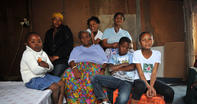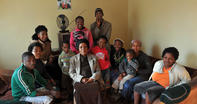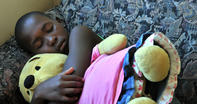Beauty Skefile

When I arrived in Cape Town I got a job with Mrs Dodson, a very nice lady, in Green Point. For eight years, I had a sleep-in job with her. My children stayed in Gugulethu and I went to see them on weekends.
The lady they were staying with was good to them and I was happy they were there. But then Mrs Dodson moved overseas and I lost my job. I didn't have money to pay the lady who looked after my children, so I sent them back to the Transkei, where my father had gone, to be with him.
Even though he was a man, and was looking after five children alone, my father was good to them. If they said they didn't want to go to look after the cattle and sheep, maybe when it was too cold, he said that was okay. He was kind to them. But in 1972, about eight years later, I went to fetch my children. I was missing them too much and wanted them to be with me. I brought them all back to Cape Town.
Felicia Mfamana

I was 39 and had never been a domestic worker before, but by then I had five children to support. There wasn't much choice. I had always been very close to my sister Neliswa. Her own husband was working in Cape Town but she offered to look after my children, along with her four. 'They are my sister's children,' she said. 'Of course I will care for them.' They would not be hungry.
They would have food from the fields and milk from our cows, and I planned to send back money to pay for the school uniforms, books and everything else they needed. It was a sickening feeling, stepping onto that bus and leaving my children behind for who knows how long.
Tenjiwe Tutu

Where were my children when I had this sleep-in job? Ask me that and you bring up a big trauma. The person who looked after my children was not good to them. It was cruelty to us not to be with our children and now, if they are not good, we think it is because they grew up without us. I had to take my first child to live with someone in Gugulethu. When I went there on one of my weekends off, the woman was nice to me and gave me a cool drink and a slice of bread.
But when my baby, who was only two or three, came asking for a piece of bread too, she said, 'No, you've had enough.' I could see the child was really begging for food. I was so, so sad inside my heart. It is a very big pain, for children to grow up without a mother. I tried to take my children to my cousin up-country, but that was not much good because one day Mrs Truter received a telegram saying I should come and fetch them within two weeks.
I didn't know what to do with them, because I needed to carry on working. Mrs Truter said, 'Don't worry. Go and find out where to put your children. Take your time and find out who is going to be good to them.' The people I worked for were so sorry for us. They said that if the law had been different, and if it was only up to them, they would give me a place to stay with my children. But because of the law, they couldn't do a thing.
By Jo-Anne Smetherham